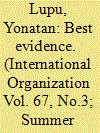| Srl | Item |
| 1 |
ID:
123015


|
|
|
|
|
| Publication |
2013.
|
| Summary/Abstract |
Independent domestic courts play important roles in enforcing international human rights agreements, thereby providing a mechanism by which international institutions can affect government policy. Yet this enforcement power is constrained not only by independence but also by the courts' ability to overcome information problems. Domestic courts' enforcement power depends on information in two ways: the costs of producing legally admissible evidence of abuses and the applicable legal standards of proof. When countries ratify international agreements, judicial enforcement can improve government practices when evidence-production costs and standards of proof are low, but not otherwise. With respect to personal integrity rights violations, evidence is especially difficult to obtain, and standards of proof are high, meaning that the courts will not be able to constrain government practices. By contrast, evidence-production costs and standards of proof are lower for other civil rights violations, so courts will be able to prosecute offenders and bring governments into line with their international commitments. Consistent with this theory, I find that commitments to the International Covenant on Civil and Political Rights (ICCPR) have significantly improved governments' respect for the freedoms of speech, association, assembly, and religion. With respect to personal integrity rights, however, I find that commitments to the ICCPR have not improved government practices.
|
|
|
|
|
|
|
|
|
|
|
|
|
|
|
|
| 2 |
ID:
107532


|
|
|
|
|
| Publication |
2011.
|
| Summary/Abstract |
Several prominent human rights treaties seek to minimize violations during emergencies by authorizing states to "derogate"-that is, to suspend certain civil and political liberties-in response to crises. The drafters of these treaties envisioned that international restrictions on derogations, together with international notification and monitoring mechanisms, would limit rights suspensions during emergencies. This article analyzes the behavior of derogating countries using new global data sets of derogations and states of emergency from 1976 to 2007. We argue that derogations are a rational response to domestic political uncertainty. They enable governments facing serious threats to buy time and legal breathing space from voters, courts, and interest groups to confront crises while signaling to these audiences that rights deviations are temporary and lawful. Our findings have implications for studies of treaty design and flexibility mechanisms, and compliance with international human rights agreements.
|
|
|
|
|
|
|
|
|
|
|
|
|
|
|
|